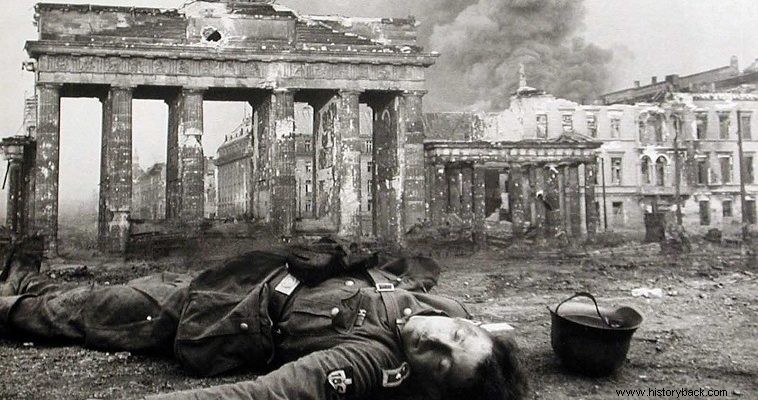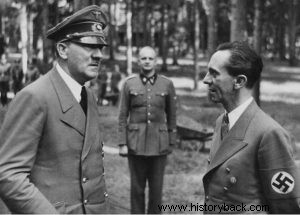
On April 25, 1945 and while the Soviet soldiers were only a short distance from Hitler's lair, another meeting took place in the bunker (Hitler's underground shelter under the Chancellery), in which Goebbels also took part. The concurrence of the views of Hitler and Goebbels, regarding the field of "high" politics, is indicative.
The dialogue...
Goebbels: In Berlin we can achieve a moral victory of historic importance. And such success is possible only here, because this is the point where all the eyes of the world are concentrated. Just because the Soviets are pouring into Brandenburg doesn't mean they've already taken Berlin. If they are pushed out of Berlin that will be a great sign for the whole world.
Hitler: I do not know if it is true but I have been informed that talks between Eden (British Foreign Secretary) and Molotov (Soviet Foreign Minister) have reached an impasse. The Russians claim all the occupied lands for themselves. This for England would mean that she has lost the war... I believe the time has come when others are also ready to form a front against the excessive, proletarian Moloch...
But if I manage to deliver a decisive blow by holding the Reich capital , the possibility would perhaps arise that the Americans and the British would somehow cooperate with a "national" (meaning Nazi) Germany against the threat from the East. The only one who can succeed in such a situation is me.
Goebbels: If there is such a case, it is certain my Führer that it could only be realized by you. If you were to abandon the city you would lose everything with it... The military situation is such that only a symbolic success purely impressive is possible to cause any development...
If the Soviets reach the Elbe and occupy the Protectorate (Bohemia), the Americans will soon be out of Germany. The British will leave 20-25 divisions (in continental Europe). Pacifist propaganda and drawing-room communism will rust the spirit of the English troops.
Hitler: ... If today we left the stage of the world so shamefully we would have lived in vain. To live a few days more or less is now a matter of indifference. Better to finish the fight with honor than to survive a few months or a year with shame.
Goebbels: If it goes well for us, it went for us. If things went badly for us, if the Führer were to meet an honorable death in Berlin and Europe were to become, in 5 years at the most, communist, the personality of the Führer will become mythical and National Socialism a myth... because quite suddenly it will purified from those human dross, which today are the object of criticism.
…and the review
The above dialogue between the two high priests of Nazism and the destruction of Germany cannot but cause astonishment to the modern scholar. Beyond Goebbels' nonsense about the withdrawal of the Americans from Europe and about the erosion or "softening" of the British Army y, the magnitude of Hitler's fantasy, but also of his vanity, is clearly visible above all.
Even if, let's say, he repulsed the first Soviet attack on Berlin, was there any chance of turning the tide of the war, given the balance of power? At best for him he would win a few more days before, trembling at the justice of men, before throwing his brains in the air, standing before the Justice of God.
It seems that Hitler was now more interested in his reputation alone. But, in any case, Germany would be the loser of the war regardless of Hitler's glorious end or not. After all, for better or worse, the winners are always the ones who decide.
The great delusion with which all the high-ranking officials of the National Socialist party considered it appropriate to boast was none other than the expectation of the now infamous diplomatic coup , that is, the breakup of the alliance against Germany, as happened during the Seven Years' War when the Tsarina of Russia died.
Whether because of the foolishness and credulity of Roosevelt (whose death, on April 12, 1945, gave Hitler new, vain hopes) towards Stalin, or simply because their primary purpose was the defeat of Germany, the Allies did not intend to engage in conflict with each other before achieving their ultimate goal.
So Hitler and his courtiers were in vain. No one was sympathetic to him and his regime, and no one was, ANYMORE, willing to negotiate with him, even if he somehow (magically?) repelled the Soviet onslaught. As far as the heroization of Hitler and his murderous regime is concerned, this of course only happened on a very limited scale.
And the "human rusts" were a permanent mark of that regime, which neither time could soften, nor of course have anything to do with the barbaric behavior of the Germans exclusively and only towards the Jews. All the conquered peoples suffered more or less, with the Greeks unfortunately belonging to the second category.
After all, the Hitler regime contained the seeds of dissolution and had no hope of prevailing without the direct or indirect support of the West, in the first difficult years of their life. It was internally corroded to render it inoperable. This was particularly evident during the war, where each Reich official had, as is commonly known, his own captaincy.


